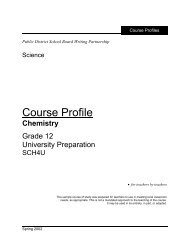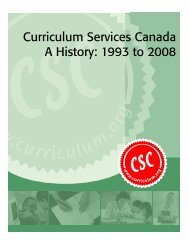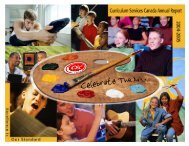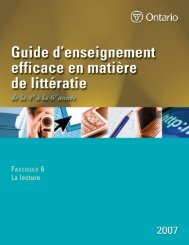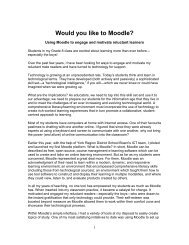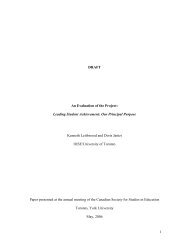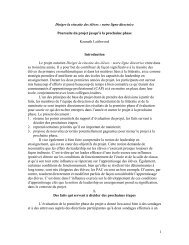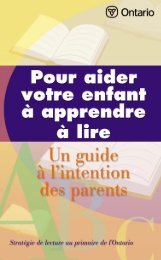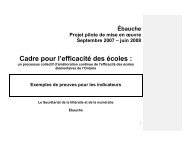Course Profile - Curriculum Services Canada
Course Profile - Curriculum Services Canada
Course Profile - Curriculum Services Canada
You also want an ePaper? Increase the reach of your titles
YUMPU automatically turns print PDFs into web optimized ePapers that Google loves.
LG2.03D - plan and make oral presentations to a small group or the class, selecting and using<br />
vocabulary and methods of delivery to suit audience and purpose;<br />
MD1.01B - demonstrate critical thinking skills by identifying the differences between explicit and<br />
implicit messages in media works.<br />
Planning Notes<br />
Gather speeches from a variety of sources; a minimum of two is recommended. Some suggestions include:<br />
Mark Antony’s “Friends, Romans Countrymen, Lend me your ears” in Julius Caesar; Martin Luther<br />
King’s “I Have a Dream”; John F. Kennedy’s “Ask Not What Your Country Can Do for You”; Gordon<br />
ed” in the film Wall Street; Jean Vanier’s “On Being Human”; The Massey<br />
lectures on CBC; David Mahoney’s “Living to 100”, found in SightLines; the valedictory address from<br />
your school’s last graduation ceremony.<br />
Teaching/Learning Strategies<br />
• Complete a socratic lesson on the nature of rhetoric and the conventions of speech writing, (i.e.,<br />
purpose, audience, tone, diction, the rhetorical question, and the use of the following: the anecdote,<br />
statistics, quotations, repetition, and figures of speech, such as metaphor and analogy). As well, the<br />
importance of the strategies of delivery, such as pacing, expression, inflection, intonation, and emphasis<br />
is a focus.<br />
• Model the explication of one speech, either in combination with the delivery of the main lesson on the<br />
conventions or as a follow up to it.<br />
• Students form groups of four and explicate a second speech on their own.<br />
• Students share their findings in a large group discussion.<br />
• Students complete the writing of a two-minute speech on a topic of their own choosing. Encourage<br />
students to select a topic that speaks to the issues that most concern them. Further, it is an opportunity<br />
for them to continue in the development and articulation of their own personal voice and moral<br />
conscience.<br />
• Students share their speech in small groups or with the whole class. If time does not permit, it may be<br />
filed as a sample in the writing portfolio.<br />
Assessment/Evaluation<br />
Formative Assessment:<br />
• Informal observation of classroom discussion<br />
• Roving conferences as students draft their personal speeches<br />
Summative Assessment:<br />
• Speech delivery via a checklist for use of rhetorical conventions and delivery style (optional)<br />
• Questions of a summative nature on the unit test<br />
Accommodations<br />
• Audio cassette recordings of the speeches under study<br />
• Audio cassette recordings of their own personal speeches<br />
• Note-taking on NCR paper by a peer or educational assistant<br />
Unit 5 - Page 13<br />
•English - Academic



